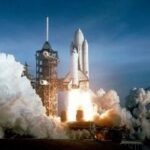If asked if space exploration should continue, most Americans would give an immediate response either in favor of continuing or in favor of ending space exploration. A common response would be that space exploration is a waste of money. The average American, uneducated on the subject, might believe that the government is wasting billions of dollars funding research that has no merit. Someone ignorant of the subject might say that a space shuttle goes up occasionally and that is about all that happens. Research is ongoing and continues when there are no shuttles being launched. This too costs the government money. Can the extreme cost of space exploration be justified?
One argument is that the government is wasting money on research not being used on Earth. Actually, the money pays the salaries of workers and scientists that support National Aeronautics and Space Administration (NASA) missions, and pays major private companies and corporations that play important roles in major sectors of the US economy. Boeing is a contractor of NASA for aircraft, the same company that makes commercial aircraft for the airline industry. (Jessa)
Space exploration is an endeavor requiring vast resources and extensive research. Because of this, only three nations have successfully sent human beings into space. (Jessa) It costs about $10,000 to put a pound of anything into a near-Earth orbit and to put a pound of anything on the moon costs about ten times more. Every time the shuttle flies costs between $500 and $700 million. (Kaku) In 2007, NASA received a little more than $16 billion in US Government funds. The return was a modest four to seven dollars of each dollar invested by the taxpayers. (Livingston) The total investment of space exploration still costs less than the $20.3 billion a year spent in the US on the toy industry. (Pop)
Another benefit to continuing space exploration is the many spinoff technologies it provides. The artificial heart resulted from experiments on the space shuttle. The hand held Jaws of Life used to save victims from car accidents originated from the system used to separate the space shuttle from its booster rockets. Insulation in homes that keeps them warm and energy efficient is based on the technology used to insulate the space shuttle. (Jessa)
There are direct benefits to the economy provided by NASA missions as well as spinoff technologies. These advances are found in food, building materials, medical procedures and the vehicles we drive. (Jessa) While it can be proven that billions of dollars that could be used elsewhere is being spent on space exploration, the benefits it provides outweigh the negative aspects. The money spent is actually an investment in improving the quality of our lives.
Works Cited
Jessa, Tega. “Benefits of Space Exploration.” Universe Today. August 24, 2009.
Kaku, Michio. “The Cost of Space Exploration.” Forbes. July 16, 2009.
Livingston, David. “Is Space Exploration Worth the Cost?” The Space Review. January 21, 2008.
Pop, Virgiliu. “Is Space Exploration Worth the Cost?” Space Daily. January 19, 2004.


